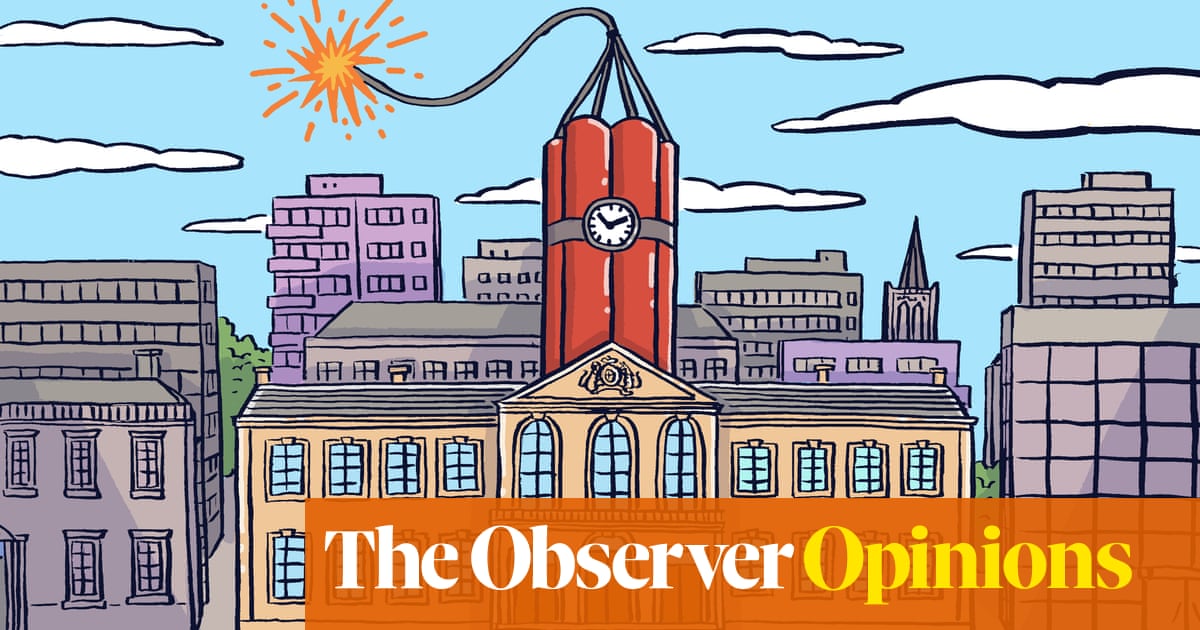Britain is discovering that the local is political, that civilisation begins with good access to social care and regular bin collections. Slash funding to local authorities over 14 years by at least 30% in real terms because Conservatives believe they are unloved, do nothing useful and, in any case, local politicians can be blamed for local cuts, and inevitably baleful consequences begin to emerge.
The first round of cuts in everything from youth services to the provision of public lavatories could go by largely unnoticed, but now we are at a tipping point. Thus, cumulatively, local authorities have closed 60% of public toilets since 2010: three in four people report shortages in their area. Core provision of support for helpless elderly people and disadvantaged young people is increasingly stretched, and on occasion almost abandoned. Local authorities as builders of social housing on any scale are a distant memory. Neglect and civic shabbiness have settled over every community in the country, with a refurbished library or civic centre a rarity. It turns out that a vibrant local public realm is as important to our wellbeing as the private.
The financial crisis in local government, as a cross-party committee of MPs reported last week, is now out of control. Denied the financial wherewithal to fulfil their basic statutory duties, nine councils have effectively gone bust since 2018 – five, the latest Nottingham, in the last 12 months – with the Local Government Association predicting that one in five risk that fate over the next two years. The financial vice in which councils are locked – eviscerated resources alongside ever-rising demand – is airily dismissed by ministers as the consequence of mismanagement, profligacy and the pursuit of absurdly grandiose schemes, confident that councils are not a popular cause. Local government can be hung out to dry.
Yet just as the condition of our prisons is a yardstick of our civilisation, so is the vigour of local government and the esteem in which it is held. As privation piles on privation – the closure of a much-loved library or gallery, roads whose resurfacing is long overdue, care homes that are disgracefully overcrowded and understaffed, even the inability to contain growing populations of vermin – the cumulative impact is forcing recognition that there must be change. We are all being diminished.
It was Margaret Thatcher who began this assault. If local democracy threw up local politicians with different political agendas to hers she would rein them in under the guise that there should be no challenge to a sovereign parliament. Thus the 1986 Local Government Act, which simply abolished the metropolitan councils governing most of Britain’s urban population – notably Ken Livingstone’s Greater London Council – and the outlawing of “propaganda on the rates”. Her next step was to try to eliminate those hated rates and substitute them with a flat rate poll tax: councils should live on short rations and only get central funding if they toed the government line. The ensuing revolt helped trigger the end of her prime ministership.
Britain’s politicians of all parties read the runes. She had succeeded in degrading local government, but in the process made constructive reform toxic. For over 30 years, nobody has dared revalue the residential property values on which the revised council tax was based in 1991, creating a revenue shortfall of up to £20bn a year, as Paul Johnson of the Institute for Fiscal Studies roughly estimates. So regressive is this tax that the Economist reported last week that Buckingham Palace is charged less than a three-bedroom semi in Blackpool. Local government’s role in our national life has decayed and shrivelled.
Councils try everything to escape the vice. One London council, Barnet, took the Thatcherite mantra to heart, and contracted out virtually all its local services in 2012. It has been an expensive fiasco – and a newly elected Labour authority is bringing services back in house to stop budget overruns and regain lost efficiencies. The more general trend, as Professor Andy Pike writes in Financialization and Local Statecraft, has been to try to turn easy credit and rising property values to civic rather than private advantage – a strategy adopted by local politicians of every political hue as central government starves them of resources. But lockdown, rising interest rates and a property market recession has turned that into no less of a fiasco.The system is bust. The secretary of state for local government, Michael Gove, has offered a £600m sticking plaster to stave off a debacle during an election year, but the quid pro quo is capped council tax increases and unspecified productivity improvements. In fact, as the MPs’ committee recommends, local government needs an immediate unconditional £4bn. Fat chance. “Localism” – declaring that control must be given back to localities – may be the new rage, but there is no parallel desire to give local government the financial capacity to be a creative local actor, let alone fulfil its statutory duties. What is required is a commitment to the value of local community, and reforms to support it.
A minimal starting point, as academics Kevin Muldoon-Smith and Mark Sandford argue, is the re-establishment of an annual needs assessment local area by local area – just as other G7 countries such as Italy, Germany and Japan do – suspended in the cause of austerity in 2013. Then, like nearly every other advanced economy, there must be a system of equalising every local authority’s financial capacity to meet those identified needs, and the creation of a statutory body independently to negotiate the rolling financial settlements that result. Beyond that, it is obvious that the system of property taxation needs an overhaul: it can’t be right that the rich property owners pay proportionately vastly less than their poorer peers. On top, enlarge what local government can do – it can help in everything from decarbonising the economy, building social housing and addressing knife crime.
Labour electoral “ strategists” will cavil at such commitments for fear they will be attacked by the Tory party. But even pensioners, the bedrock of the Tory vote, can be persuaded that civic pride and public amenity, whether a public library or a public toilet, are invaluable. Labour should have more confidence. We can’t go on like this.







